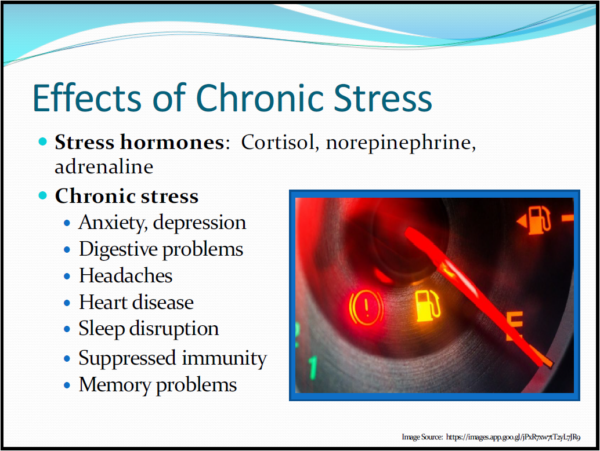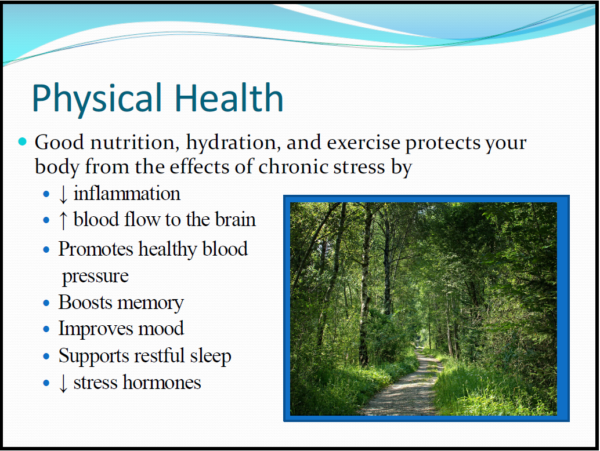May 2021
Caring for someone with Alzheimer’s or another type of dementia can be challenging, but learning how you can develop resiliency can help. See what lessons you can learn from Dr. Miriam Galindo’s Developing Resiliency presentation from our Fill Your Cup: Caregiver Strategies for 2021 caregiver conference.
Developing Resiliency is critical for caregivers
Unchecked stress can be harmful. As Dr. Miriam Galindo mentioned during her presentation, “Left unchecked, it can create emotional and physical disease.” These diseases can include anxiety, depression, digestive problems, headaches, among others.

The negative impact of chronic stress
That’s why developing resiliency is so important. What is resiliency? Galindo gave a comprehensive definition.
“Resiliency means there are gonna be challenges, there are gonna be adversities, but you are not going to break under pressure. You are going to emerge stronger and healthier despite it and maybe even because of it. You are going to be a stronger person for it.”
Despite the challenges of caregiving, the following six strategies can help enhance resiliency.
Positivity
Being positive in the face of dementia can often be difficult. Even though we can’t change the circumstances, we can change our perception. That’s where being positive comes in.
There are two components to adapting a positive perspective: adjusting your vision and realistic optimism.
1) Adjusting your vision
Caregivers might not be able to do some of the things they use to be able to do. Adjusting your vision includes “setting a new standard for yourself and that is quality over quantity. Quality meaning increased joy and minimization of pain over fear” for your loved one.
2) Realistic optimism
Realistic optimism doesn’t mean you have to be in denial of your situation. It involves “seeing things for what they are, but that you are going to search for that positive silver lining.” Continuing to strive towards a place of acceptance, understanding the challenges and getting informed, and being aware of the things we say to ourselves are all key to accomplishing this.
Behavior can have a positive influence on how we feel.
“Going through the motions of what happy people do will actually make you feel happier.”
So practicing a smile, seeing someone else smile, or laughter can positively affect our physical and emotional wellbeing.
Play music
Research has demonstrated that music can be beneficial for caregivers and for those who have dementia.
For example, studies have shown that 25 minutes of classical music a day lowers cortisol levels, triggers the release of dopamine, reduces anxiety up to 65% and can have other positive effects.
Loved ones with dementia can also benefit from music.
“Even as your loved one’s brain is degenerating […] the part of the brain that preserves familiar music is spared.”
That means that people who live with dementia can still be impacted by music. For instance, research has shown that music can “significantly reduce anxiety and agitation in individuals with dementia.”
Physical health
Caregivers may often not prioritize their wellbeing for the sake of others, but it’s important they pay attention to their own health needs and routines. Here are some research-based health tips to consider:
- Drink plenty of water every day (our bodies are made up of 60% water)
- Eat plenty of fruits and vegetables every day (they can reduce inflammation and be a good source of antioxidants)
- Follow up on dental appointments at least every 6 months (tooth decay can lead to bacteria going into your bloodstream)
- Go for a walk
- Spend 20 minutes in nature (check out our “Walking Corner” for a list of walking and running trails in Orange County)
Together good nutrition, hydration, and exercise help protect your body from the effects of chronic stress in a variety of ways.

Benefits of maintaining your physical health
Meaning and purpose
Galindo addressed the fifth suggestion saying, “It’s more important to find why you’re in this than what. Instead of looking at the circumstances, look at the purpose and meaning through that circumstance.”
Finding that meaning and purpose makes it easier to bounce back from adversity and gives you the energy to meet your demands.
Try doing the following to help strengthen your meaning and purpose:
- Practice gratitude
- Identify a purpose that brings you passion and joy
- “Immersively imagine the outcome” (a concept described by Auswchitz-survivor, Victor Frankl that involves picturing yourself doing something in the future you’re looking forward to)
Recruit your posse
Isolation can increase stress, lower immunity, and increase negative thoughts. Recruiting a team that you could rely on to support you is essential.
The COVID-19 pandemic has made connecting with others more difficult, so those caring for someone with dementia may often have to be creative in finding ways to stay connected. Here are some ideas Galindo shared:
- Talk with other caregivers who understand what you’re going through. See available support groups here
- Schedule respite care and take time away, if only for a few hours a week.
- Get educated on the road ahead: Knowing the guideposts will enhance a sense of control and lower anxiety
- Feed your spirit: do things you enjoy
- Build a team (Remember you are not alone)
For additional support or to learn more about our services and programs please call our Helpline at 844-373-4400 or visit alzoc.org. Sign up for our newsletter to stay up to date on our latest educational courses, view resources and more.
To watch Dr. Galindo’s entire presentation and the rest of the caregiver conference program please click here.



